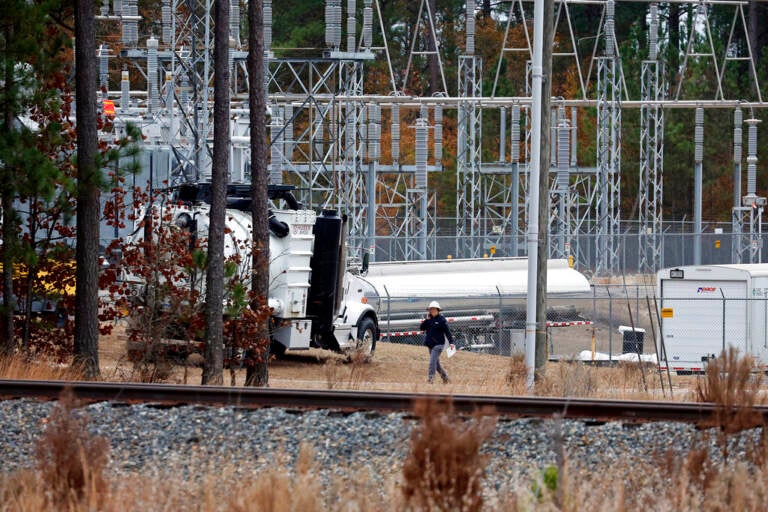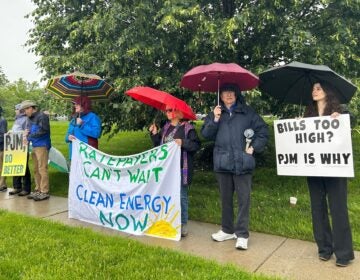‘It’s not just a Baltimore issue’: PECO says thwarted grid attack reinforces importance of security efforts
Amid a rise in white nationalist plans to attack energy systems, Philly’s electric utility says it’s working to prevent similar threats.
Listen 1:05
File photo: Workers work on equipment at the West End Substation in West End, N.C., Dec. 5, 2022, where a serious attack on critical infrastructure has caused a power outage to many people around Southern Pines, N.C. (AP Photo/Karl B DeBlaker, File)
Domestic terrorists allegedly planned an attack they hoped would “destroy” Baltimore. They aimed to plunge the city into chaos by disabling its power grid, but were thwarted by the FBI. Law enforcement officials and utility operators say they’re working to prevent similar attacks in the Philadelphia area.
Two neo-Nazis are charged with plotting the attempted attack in Baltimore. Experts worry electrical infrastructure has become a target for far-right extremists, and Philadelphia is not immune.
“It’s not just a Baltimore issue, it’s a Philadelphia issue,” said Benjamin Schmitt, senior fellow at the Kleinman Center for Energy Policy at the University of Pennsylvania. “It’s a national issue.”
The FBI arrested Brandon Clint Russell and Sarah Beth Clendaniel and accused them of conspiring to destroy an energy facility by shooting five electrical substations in the Baltimore area. Allegedly, the couple wanted to “completely destroy” the majority-Black city and spark civil unrest.
Electrical infrastructure attacks have been made before. Several recent physical attacks have been carried out on electrical infrastructure, including one in December in North Carolina that initially caused 45,000 people to lose power, and another later that month in Washington State that left close to 15,000 customers in the dark. The motive in the Washington case appears to have been an attempt to cover up a burglary, while the intent behind the North Carolina attack is still unknown.
“Right now, we’re dealing with a spate of these attacks,” said Brian Michael Jenkins, senior adviser to the president of the RAND Corporation and an expert on terrorism. “Safe to say we probably will see more. But as more individuals are identified and arrested, that tends to have a discouraging effect.”
PECO, the electric utility that serves Philadelphia, and the utility targeted in the Baltimore plot are both owned by the same parent company. PECO spokesperson Greg Smore said the company shared details of the charges with employees “to ensure awareness,” and said the company remains in “close contact and collaboration” with law enforcement.
“This potential event, and those like it, reinforce our important work to enhance the security of our facilities and our ongoing partnerships with law enforcement as industry threats have increased in recent years,” Smore said in a statement.
Research has shown a rising threat of white nationalist attacks on energy infrastructure. A report published last year by researchers at George Washington University concluded that from 2016 to 2022, the frequency of white supremacist conspiracies to target energy systems “dramatically increased,” with 13 people charged in federal court.
“Critical infrastructure attacks serve a dual purpose for white supremacists, accomplishing the operational goals of fomenting societal division as well as being a step towards their broader strategic and ideological goals of triggering a societal collapse,” the authors wrote.
Electrical infrastructure has been a target of domestic terrorists with various ideologies for decades, Jenkins said.
“We are heavily dependent on electricity,” said Jenkins. “There are power lines throughout not only the United States, but just about every country. Remote power substations are common.”
Some experts say a series of targeted attacks on electric substations, which change the voltage of electricity, could disable much of the U.S. power grid.
“It’s not particularly operationally challenging to [attack a substation],” Jenkins said. “This can be a low-tech operation. People with explosives or people with a high powered rifle or, if they penetrate the system, even hand tools can do a great deal to cause damage to the facilities. These facilities are often unguarded.”
In recent years, these types of attacks and plots have generally been “one-offs” orchestrated by just a few people, Jenkins said. It would take “more sophistication” to produce wide-spread, sustained damage to the grid, he said, and law enforcement response has improved over time.
“It is not easy to … cause far-reaching, long-lasting consequences,” Jenkins said.
Still, more investments in security and monitoring of energy infrastructure is needed, said Penn’s Schmitt.
He said effective tools include drones and small commercial space satellites for monitoring, advanced cybersecurity, and protecting physical infrastructure with concrete barriers.
“This is pretty basic stuff,” he said. “We’re not talking about rocket science here.”
In December, federal energy regulators ordered a study of how well existing physical security standards for the electrical system work and whether they need improvements.
PECO has “significantly increased” its investment in grid-hardening capital projects, monitoring, and surveillance over the last decade, Smore said. The company aims to stock back-up equipment for quick repairs and have a grid design that allows power to be routed around damaged areas. The company also conducts drills and maintains regular contact with local and federal security agencies around “constantly evolving threats.”
“Protecting our electric grid and natural gas infrastructure and ensuring their continued security, safety, and reliability for our customers are our top priorities,” Smore said.
The FBI’s Philadelphia field office collaborates daily with private sector entities and other law enforcement agencies to “detect and disrupt” threats to critical infrastructure in the area, said spokesperson Carrie Adamowski.
“We continue to remain vigilant in the wake of the Baltimore plot arrests and other recent incidents targeting the electrical grid,” Adamowski said in a statement. “As always, we’d ask members of the public to report anything they consider suspicious to law enforcement.”
Aaron Moselle contributed reporting.

Subscribe to PlanPhilly
WHYY is your source for fact-based, in-depth journalism and information. As a nonprofit organization, we rely on financial support from readers like you. Please give today.









